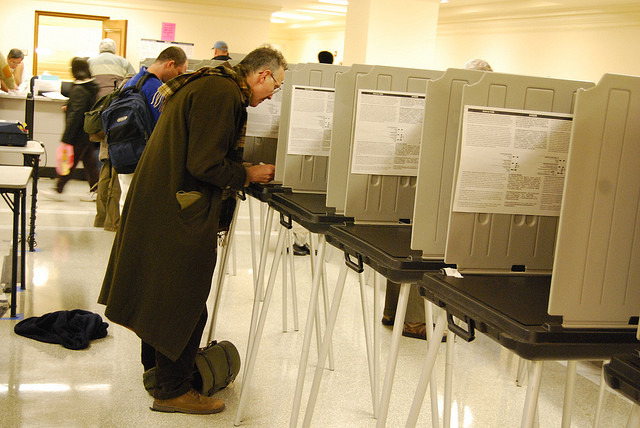
In Squaring Off, Zócalo invites authors into the public square to answer five probing questions about the essence of their books. For the first round, we pose questions to the author of The Ethics of Voting.
Most of us think of voting as a civic duty. In The Ethics of Voting, philosopher Jason Brennan argues that we have it all wrong. Not only should most of us feel fine about staying home on Election Day; we have a moral responsibility to do so.
1) I’m dumb and ignorant. Why not give me a simple test to keep me from voting?
 Good question. I’ve argued for that position in a recent article. Here’s the case for competence exams: When we vote, we’re exercising power over innocent people (often it’s the majority over minority). We can deprive them of property, liberty, and life. So they are entitled to a competent electorate.
Good question. I’ve argued for that position in a recent article. Here’s the case for competence exams: When we vote, we’re exercising power over innocent people (often it’s the majority over minority). We can deprive them of property, liberty, and life. So they are entitled to a competent electorate.
Still, competence exams have their drawbacks. First, the exams would be administered by people, not by saints, and we know from history how they’ve been abused to disenfranchise minorities. So we can expect some degree of corruption. (Another danger: Special interest groups might fight to control them.) Second, it’s not clear what you put on the exam. Econ 101? Historical trivia? Reasonable people disagree about what counts as political competence. But it’s worth noting that we do exclude some citizens because we think they’re incompetent: children.
2) So it seems you’re saying testing is ethical in theory but unethical in practice. But your book is about ethical theory. So what use is it in practice?
The moral principle-to vote well or not at all-isn’t impractical. It’s easy to satisfy: just stay home. The trouble is, democratic culture encourages us to think we’re smarter about politics than we really are. Plenty of bad voters view themselves as good voters. Just because I’m 18 doesn’t mean I know how to do carpentry or repair a car. But we seem to think that being 18 and American qualifies us to know how to run our government. A virtuous person would refuse to exercise power when she wasn’t competent to use it.
3) But, as you say, it’s precisely the bad voters, the dummies, who think they’re good voters. So let’s say I’m smart but I stay home. How is allowing the bozos to increase their share of the vote an ethical choice?
Let’s be clear: just because someone is a bad voter doesn’t mean she’s a dummy. I don’t know how to do carpentry, but that doesn’t make me dumb. Most bad voters could vote well if they put in the effort.
By abstaining, you don’t make any difference. Other people might be administering government incompetently-but at least you aren’t part of the problem. On the other hand, if you are a member of a voting bloc, and you have strong grounds for believing that your voting bloc will improve government, then you’ve got reason to vote as a group. But if your grounds for that belief are really so strong, then you’re probably good voters.
4) Wait, if I know that voting with my group is good for the country, I’m probably a good voter? Most voters are members of the Democratic or Republican group–or members of groups like the SEIU or the National Rifle Association–and vote on that basis. Are you saying that’s fine?
 I was thinking of unusual cases where your faith in your voting bloc rests on strong evidence. Most Republicans, Democrats, NRA members, and SEIU members probably believe they qualify as a good voting bloc, but very few of of them have good grounds for these beliefs.
I was thinking of unusual cases where your faith in your voting bloc rests on strong evidence. Most Republicans, Democrats, NRA members, and SEIU members probably believe they qualify as a good voting bloc, but very few of of them have good grounds for these beliefs.
I like to illustrate this with a fictional character called Betty Benevolence. Betty sincerely wants to make the world better and increase human happiness. But, in the real world, she makes everything worse. When she sees someone starving, she thinks she can help by taking his remaining food. When she sees someone in pain, she kicks him in the shins. However kind Betty may be in her heart, she’s so irrational that she just makes things worse. The average voter is like Betty Benevolence.
5) Let’s suppose that Betty Benevolence is willing to stay home if she’s unqualified to vote. What practical test should she give herself to figure that out?
I’m writing a book about this, actually. But a good start for the average voter would be to answer these three questions:
1. Do you tend to think people who disagree with you politically are honest but mistaken-as opposed to corrupt and stupid?
2. Do people who disagree with you about politics often tell you that you seem reasonable?
3. Do you seek out plausible defenses of alternative points of view?
If your answer to all three of them is “no,” then please be a true patriot: stay home on Election Day.
Buy the book: Skylight Books, Powell’s, Amazon
*Photo courtesy of Steve Rhodes.



